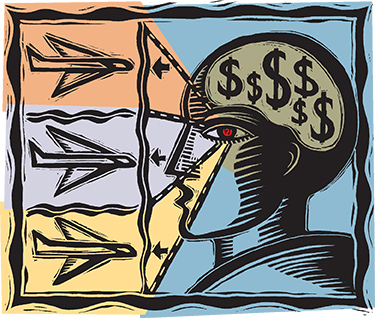‘Hamlet’ could be the answer to air fare uncertainty
 “To buy or not to buy, that is the question,” ask many air travelers, echoing Hamlet’s famous soliloquy. Ticket prices can change by the minute, and prices for the same flight can vary by more than $2,000, depending on when the ticket is purchased.
“To buy or not to buy, that is the question,” ask many air travelers, echoing Hamlet’s famous soliloquy. Ticket prices can change by the minute, and prices for the same flight can vary by more than $2,000, depending on when the ticket is purchased.
An answer may be coming soon on ticket timing. In April, researchers at the UW and the University of Southern California announced a new computer program called Hamlet that predicts the best time to buy an airline ticket.
“If you’re on an airplane and look around at your fellow passengers, probably every single person on that plane has paid a different price,” says UW Computer Science and Engineering Professor Oren Etzioni.
Airlines are famous for raising and lowering fares in an attempt to maximize revenue. If you have a standing inventory — passenger seats, hotel rooms, rental cars — you want to sell as much of that inventory as possible and may decide to do a promotion if some of it is standing empty. Airlines have become among the most sophisticated users of “dynamic pricing” to get the most out of their product, using algorithms that are closely guarded as trade secrets to vary pricing.
Etzioni and his colleagues at the UW and USC have overcome those codes with their own algorithm. During a 41-day pilot run, the algorithm saved 607 simulated passengers a total of $283,904 on airline fares by advising when to buy and when to postpone purchases.
In examining how the fares behaved, they found that the price of particular flights changed as often as seven times a day. Over time, the range in prices could be extreme-for one flight on the LA to Boston route, for example, the high was $2,524 for a round trip ticket, compared to a brief low of $275. The high from Seattle to Washington, D.C., was $1,668 compared to a low of $281.
“Look how big those jumps are,” Etzioni says. “If you were going from Los Angeles to Boston and could buy in that window when the price dropped, you could save more than $2,000 on the ticket price. The potential savings are huge.”
Etzioni and his colleagues at the UW and USC have filed for a patent on the algorithm. Commercial applications will follow-Etzioni is already talking to on-line ticketing agencies. While the airlines aren’t likely to welcome Hamlet, Etzioni believes their options for retaliation will be somewhat limited.
“We’re looking at prices that are available to people,” Etzioni says. “If the airlines start playing with the prices to trick us, they also have the potential of shooting themselves in the foot.” In other words, the prices are juggled to maximize profits, and if airlines manipulate them to obfuscate things for algorithms like Hamlet, they are also changing their chance of selling a ticket.
“I would never underestimate the cleverness of another party,” Etzioni adds. “But their hands are somewhat tied.”